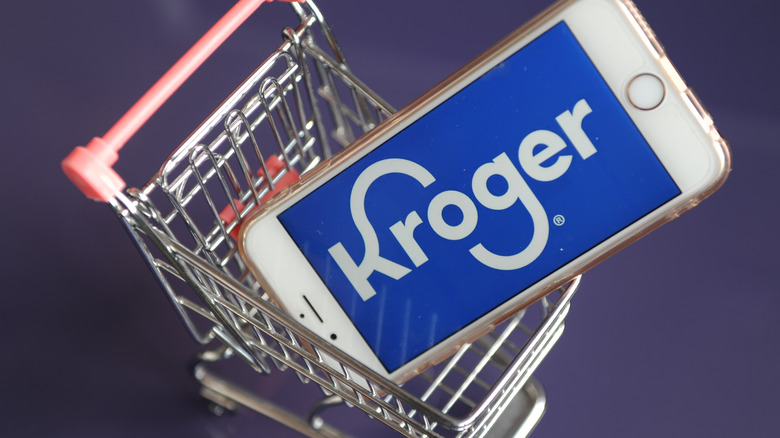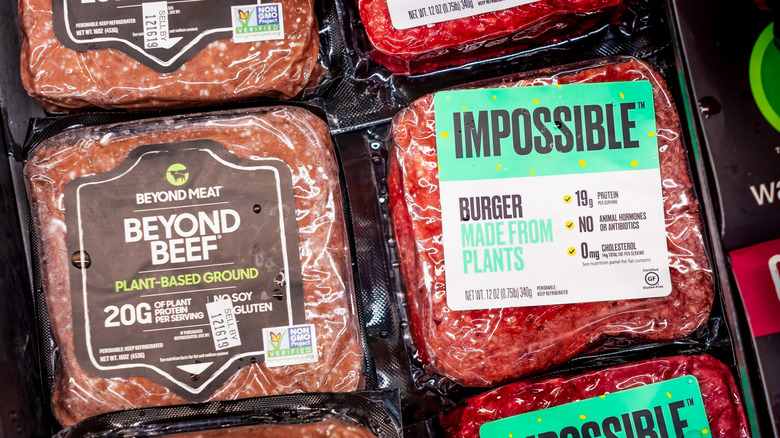Study Sheds Light On Kroger Shoppers Who Shifted To Plant-Based Foods
Oat milk, Beyond Meat, and vegetable dishes galore. Plant-based eating is no longer a trend but a lifestyle — one that is here to stay, as recent research has shown.
Even if you've only half been paying attention, the rise of plant-based foods is obvious when walking into any grocery store, cafe, or restaurant. What used to be wall-to-wall cow milk is now an inclusive mix of alternative dairy brands. And vegan folks now have their pick of high-end restaurants that don't just point them to the salad but include them in a gourmet experience.
Even college dining halls have gotten with the times by introducing more vegetable-friendly dishes on university campuses. And though cooking with vegan foods can come with its fair share of trial and error, more and more Americans have gradually warmed to these products. Recently, the Plant Based Foods Institute published a Consumer Research Report, which focused on the patterns of plant-based food consumption exhibited across Cincinnati-born Kroger supermarkets — a chain that has stores and shoppers that span the continental U.S.
The latest research assessed Kroger shopper data to analyze plant-based dining habits, incentives, and outcomes. The report found that interest in plant-based products is palpable both for both shoppers experienced with the products and those new to the plant-based scene. However, due to high prices and other variables, market growth for these products is another story.
Interest in plant-based foods is (broadly) growing
Plant-based food sales have shot up over the last few years, as proven by the latest Plant Based Foods Institute research. The U.S. market increased from 2018's $4.8 billion to $7.4 billion in 2021. And that increase is not just for sales. There's also been a clear upward trajectory in the number of people who consume plant-based products.
Their analysis also shows that many households that purchased plant-based items also reduced the amount they spent on foods that come from animals. This means that the money saved on the likes of prime rib and whole milk has instead gone toward Impossible Burgers and soy creamers. How's that for commitment?
According to Food Dive's analysis of the Kroger data, several things have contributed to this rise in plant-based shopping. They hone in on the study's analysis of health concerns, which topped the list of consumer motivations; 54% of consumers cited this as the main reason they are choosing to move to plant-based diets. Roughly half of Kroger consumers believe that plant-based meals are healthier than animal-based ones, and 39% of people prefer the taste of plant-based foods. Whatever their reasons, Kroger's shoppers are flocking to alternatives to dairy and meat.
A recent slump for plant-based foods
Although the report's findings reflect an interest in the plant-based market, this year's growth has proven more gradual than years prior (via Food Dive). For example, in 2020, 59% of shoppers buying plant-based foods were new to it. The next year, however, that same category saw only a marginal increase, with 54% of shoppers new to or retaining their plant-heavy lifestyle.
Broader industry trends reflect these findings. In November, The Washington Post reported a slowdown in the alternative meat market. Growth for these companies stalled in 2021, and retail sales for 2022 dropped by about 10%. Specifically, Beyond Meat's stock has significantly declined, resulting in layoffs. Other vegan alternatives have also shown a similar stagnation. WaPo reports that the slump in this market is due to a combination of a lack of variety and high prices for these items, as well as lingering skepticism in some about the health benefits of these foods.
Despite the national slowdown across the plant-based industry, the number of plant-based shoppers across Kroger stores reflects an ongoing interest in alternative options. Food Dive suggests that the sector is far from doomed, citing continuous investment, innovation, and sales in the sphere. As many start to consider resolutions for the new year, so might Kroger need to consider what to stock their shelves with. And such decisions will further shed light on where the patterns for plant-based shopping is headed.


